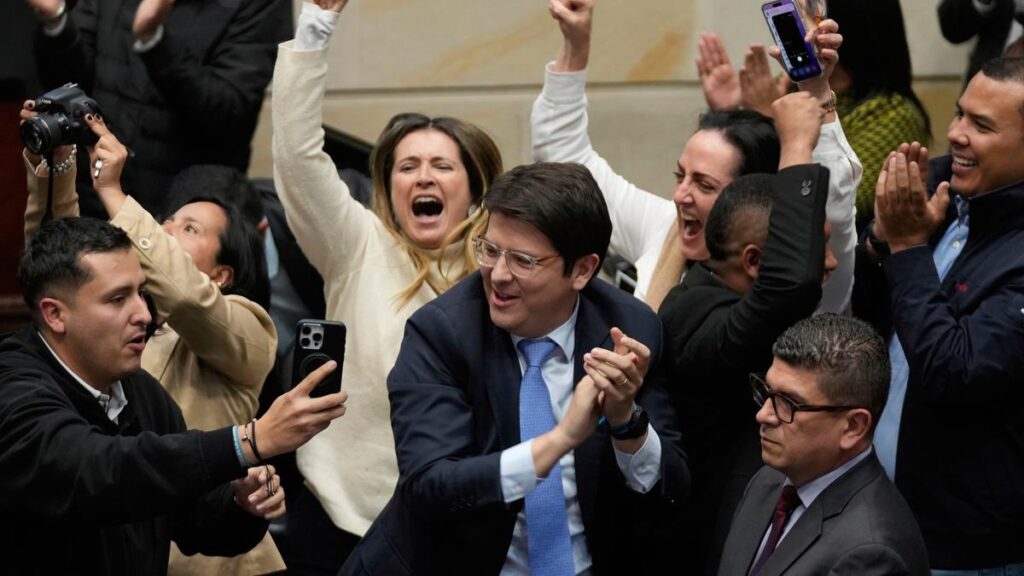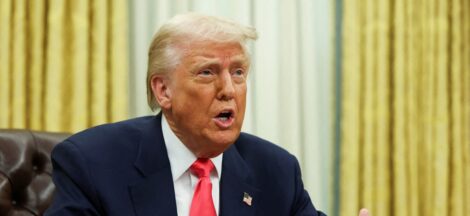By Satyaki Chakraborty
The South American nation Columbia is in political turmoil as the left wing President Gustavo Petro went to the people of the country with his proposal for labour reforms through referendum after the Senate rejected his proposal. The Senate is dominated by the anti-Left parties. Petro is fighting them since he took up the presidency in 2022 as the first left wing President. He was involved in the revolutionary group that fought the Columbian authoritarian regime in earlier years.
Protests were held in various cities of Colombia including capital Bogota as supporters of President Gustavo Petro expressed their solidarity for his proposed labour reform, with the country rattled by an eruption of violence in the last week amid fears of a return to darker days of assassinations and bombings. Since the signing of the decree on Wednesday to hold a public referendum vote on labour reform, the trade unions of the ruling coalition mobilized their cadres and continued demonstrations in support of the President. The opposition also tried to organize their protests against President’s bypassing the Senate, but their participation was low compared to Left coalition supporters.
The protests come as Colombia is still reeling from bombing attacks in the southwest of the country that left seven dead and an attempted assassination on conservative opposition senator, and presidential hopeful, Miguel Uribe Turbay at a campaign rally in Bogota. Colombia is going for the next Presidential elections in 2026 and already campaign has started in full swing.
Petro was in Cali, the third largest city of Columbia on Wednesday morning to lead a security meeting with local authorities and the military following Tuesday’s attacks. The president also said they would be investigating possible connections between the bombing attacks and the attempt on Uribe’s life.
The 15-year-old boy, who police believe was a hitman working for money, is accused of trying to assassinate Uribe and was also charged with carrying a firearm. He was formally charged on Tuesday and pleaded not guilty, the prosecutor’s office said on Wednesday. President Petro himself monitored the health condition of the seriously injured Senator. Colombia has many armed gangs and lot of people work as hitmen on behalf of drug lords and oligarchs.
The reforms in Petro’s bill included increased pay on Sundays and public holidays, changing the number of weekly working hours and changing over-time hours. Rejecting this, the opposition in the Senate presented an alternate bill on labour reforms.. This alternate bill is liked by the employers but this has been rejected by the trade unions. It will be seen whether the Senate passes it and uses it as a weapon against the President.
The referendum has become the crux of long-running tensions between the executive and legislative branches. After the Senate rejected President Petro’s labour reforms twice, the latest in March this year, Petro sent the Senate members a 12 question referendum proposal on May 1. The Senate voted 49-47 against the measure two weeks later forcing him to go to public with his referendum plan bypassing the Senate. President has accused the opposition senators of acting against the interests of the labour.
The referendum’s questions include whether workers should receive double pay for holiday work, whether daytime workdays should end at 6pm and whether open-ended contracts should be offered to workers to prioritise job stability.
The disagreements between Mr Petro and Congress date back to the start of his term in 2022, but they have heightened as he seeks to consolidate his legacy ahead of next year’s legislative and presidential elections. During his tenure, Petro has improved relations with China and Russia while trying to maintain normal relations with Trump though Columbia was the target of the U.S. President at the initial phase of deportation of illegal immigrants through chained hands
President Petro is aware of the serious challenge he is facing on his referendum decree from courts. In anticipation of that President Petro said that his government will send the referendum decree to Colombia’s constitutional court for review. At the same time, the Council of State is considering a law suit seeking to annul the Senate v
Colombia is nicknamed the “gateway to South America” because it sits in the northwestern part of the continent where South America connects with Central and North America. It is the fifth largest country in Latin America and home to the world’s second largest population of Spanish-speaking people.
Colombia’s biggest trading partner is the United States, which buys 40 percent of the country’s exports. Colombia sends a variety of items overseas, including coffee, bananas, oil, coal, gold, platinum, and emeralds.
One of Colombia’s worst exports, though, is illegal drugs. With help from the United States, the Colombian government is carrying out Plan Colombia, a costly and wide-ranging effort to rid the country of the gangs, called cartels, that produce illegal drugs for sale around the world. (IPA Service)


 Congress Party Workers In Uttar Pradesh Upbeat About Early Revival
Congress Party Workers In Uttar Pradesh Upbeat About Early Revival 